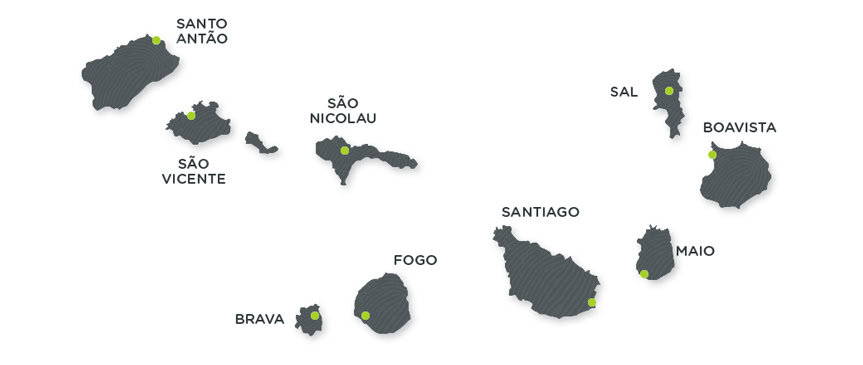Overview

Find out more about the Nine Islands of Cape Verde here.
When UK folks think of Cape Verde they usually think of Sal or Boavista‘s amazing beaches and resorts. We’re here to help anyone who wants to explore beyond, to African-feeling Santiago, the volcanic island of Fogo, remote and friendly Brava, elusive Maio with it’s deserted beaches, friendly and mountainous Sao Nicolau, vibrant Sao Vicente with the cosmopolitan-feeling city of Mindelo and, of course, not forgetting Santo Antao with it’s lush northern valleys. Read more below or call our friendly team for a chat on 01768 721030.
Useful Information
Getting to Cape Verde
Flight connections from the UK are excellent with 9 direct flights a week operating from London and other regional airports. Flight times are just under 6 hours and on certain flights upgrades may be available for a supplement. There are also direct flights from Lisbon, Amsterdam and Boston. TAP Air Portugal also operates daily flights via Lisbon to Sal, Santiago, Boavista and Sao Vicente throughout the year.
Getting around Cape Verde
The local airline BestFly Cape Verde operates regular internal flights between all islands, except Santo Antão and Brava which are accessed by local ferry. Bring a flexible attitude! Inter island flight times are often subject to change. If you're travelling with us, we're here to help you have a smooth holiday: a member of our staff in Cape Verde will advise you and make any necessary amendments to your itinerary.
By Ferry
There are regular services between the islands of: Fogo and Brava (four per week); Sao Vicente and Santo Antao (twice a day); Sao Vicente and Sao Nicolau (two per week). The ferry tickets you'll need are included when you travel with us.
By Taxi
The private transfers we organise for guests are in small taxis or minivans. On your free days, or sometimes during guided days, you could travel like a local and take an 'Aluguer'. These are small minivans or pick-ups that serve as shared taxis. They depart when full from a central point, with people getting on and off during the journey. Aluguer fares are relatively cheap unless you are hiring privately.
Car hire
Car hire is becoming increasingly available and on some islands they add to the overall holiday experience. Car hire is more expensive than in Europe and most hire cars tend to be small 4x4 jeeps (Daihatsu or Suzuki). When hiring a car you will be required to leave a security deposit.
Sailing
If you're not in a rush then sailing between the islands maybe the perfect way to get around. We have access to yachts on Sal and Sao Vicente and can tailor journeys to suit your experience and available time.
Tourist visas are no longer required for UK and EU citizens. Check your passport is valid for at least 6 months after your planned return date. If you are travelling with us we will arrange your airport security tax pre-payment. You will just need to fill out an international travel form to enter or travel through Cape Verde. It is recommended that you take a copy of your travel insurance policy for consultation in case of an emergency.
Cape Verde has reasonable healthcare and does not have contagious or endemic diseases despite its proximity to the African continent. Because of this there are no vaccinations required for a visit although you should check you are up to date on polio and tetanus. Ask your family doctor if any new vaccinations are necessary or check the NHS website www.fitfortravel.nhs.uk. Tummy upsets do happen and following simple rules like washing hands before meals, drinking bottled/treated water and keeping out of the sun make a big difference.
All hotels in Cape Verde charge a room tax of 220CVE per person per night (€2). This tax cannot be pre-paid. Children under 16 years are exempt. If you have a stopover in Lisbon, Lisbon hotels are required to charge a room tax of €2 person per night. Again this tax cannot be pre-paid. Children under 12 years are exempt and the total is subject to a maximum of €14 per guest.
The national currency is the Cape Verde Escudo (CVE or $). You'll need to exchange in-country as the Escudo can't be taken in to or out of Cape Verde. You are advised to bring Euros or sterling cash with you to exchange in-country since the charges for exchanging travellers cheques are extremely high. Please note that most goods have to be imported, so although most costs are less than the UK, this is not a budget destination. It is worth remembering that not all credit cards are accepted and there are only a few ATMs on most islands.
The Cape Verde islands are 1 hour behind UK time in the winter and 2 hours behind in the summer.
The traditional Cape Verdean dishes consist mostly of fish (or in rural areas, chicken is available) with rice, beans and some recognisable vegetables (cabbage, carrots, potatoes, sweet potatoes, tomatoes, pumpkin etc.). Food is tasty but simple and the local fresh fish is excellent. Beer, wine and local spirits are widely available including the famous Grogue, a local sugar cane liquor often drunk with honey (Ponche). Grogue factories can be found on Santo Antão where you can watch it being made. There are also some excellent red and white wines being produced on the islands.
English is spoken by our guides and most hoteliers but it would be worth having a few Portuguese or French phrases to hand, especially in cafes and restaurants. Portuguese is the official language of Cape Verde but everyone speaks ‘Criolu’ (creole) – a mix of Portuguese and particular African words and dialects. French is commonly understood too.
The Cape Verde archipelago is considered one of the safest African holiday destination and the crime rate is very low. However, petty theft is becoming more common especially in built up areas so we advise only carrying enough money for the day and keeping the rest in a hotel safe. There are no dangerous animals such as snakes and scorpions. Probably the most important safety issue on the islands is the strong undertow at many of the beaches, so do check with the locals before you swim.
Climate
The tropical climate of Cape Verde is warm and dry all year long, with rain showers being scarce; but rainfall does vary from island to island giving average rainfall figures of between 10 and 900 ml. The rainy season usually only lasts from August until October when the south west monsoon hits the islands although this affects different islands to different extents. Instead of the classic four seasons, the Cape Verde Islands only have two: The Tempo das Brisas (time of the winds) from October to mid-July and the Tempo das chuvas (rainy season) from August to September, when there may be heavy tropical rainfall. The ‘windy’ season is from October to June caused by the harmattan (dry hot winds from the Sahara) and results in excellent watersports but also dust in the air.









Follow us online